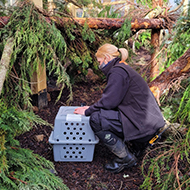
Nell is the first of 16 cats that will be prepared for life in the wild.
A Scottish wildcat has been introduced to Royal Zoological Society of Scotland's (RZSS) Highland Wildlife Park in a bid to save the elusive species from extinction.
Young female Nell is the first Scottish Wildcat to be introduced to the Park's 'breeding for release' centre - an off-show centre, which provides breeding space, veterinary care, remote monitoring and training to prepare cats for life in the wild.
Nell arrived from Alladale Wilderness Reserve earlier this month and is said to be settling in well. Conservationists hope any kittens she rears will be among the first cats to be released into the Scottish Highlands next year, as part of a project to restore the critically endangered-species in Scotland.
The project is being led by RZSS in collaboration with NatureScot, Forestry and Land Scotland, the Cairngorms National Park Authority, Norden’s Ark and Junta de Andalucía.
“Saving Wildcats is an incredibly exciting partnership bringing together the necessary resources and expertise to save Scotland’s iconic wildcat,” commented David Barclay, Saving Wildcats ex-situ conservation manager. “Nell is the first cat to be introduced into our breeding for release centre at Highland Wildlife Park and she has settled well into her new surroundings.
“A further 15 cats will be arriving at the centre in the coming weeks, giving us a healthy, genetically diverse population to breed from. Offspring will then be transferred to larger pre-release enclosures as they mature where they will undergo a dedicated training programme to prepare them for life in the wild. We hope the first cats will be ready to be introduced into a site in the Scottish Highlands in 2022.”
Image (C) RZSS.



 The Veterinary Medicines Directorate (VMD) is inviting applications from veterinary students to attend a one-week extramural studies (EMS) placement in July 2026.
The Veterinary Medicines Directorate (VMD) is inviting applications from veterinary students to attend a one-week extramural studies (EMS) placement in July 2026.